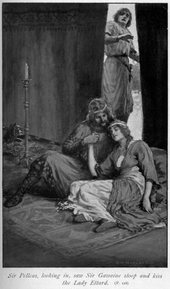Pelleas and The Five Stages of Grieving a Break-up
By Abigail Levasseur ’24
In Tennyson’s Pelleas and Ettarre, Pelleas is so entranced by Ettarre’s beauty that he convinces himself that she would make the perfect paramour. However, Pelleas is arguably more “in love with love” than with Ettarre. His desire to rush into a relationship is likely inspired by his fellow, older, more experienced knight’s of the round table. Ettarre is clearly not interested in Pelleas, or is at least only briefly pretends to be interested for selfish reasons. Even with her rude and lousy treatment, Pelleas is still blinded by irrational love and admiration, which results in his even more irrational “heartbreak.” When it comes to ending a relationship, psychologists have determined that people typically go through the “five stages of grief”: denial, anger, bargaining, depression, and acceptance. Though warped in order due to his unorthodox one-sided relationship, Pelleas appears to circulate through all five of these stages.
Stage 1: Denial. Pelleas displays “denial” in his relationship with Ettarre by continuously returning to her castle after being thrust out by guards, screamed at, and belittled. At one point Ettare demands, “he haunts me – I cannot breathe – beseiges me; Down! Strike him!” (l.220). If these commands aren’t enough to signal that the (lack of) relationship is over, then I don’t know what is! Even though Ettare has refuted love, Pelleas reasons that his constant devotion and knightly strength will eventually win her over. He justifies that “all these pains are trials of my faith” (l.237). Clearly he is too in denial to see that the relationship has a two percent chance of survival.
Stage 2: Depression. Pelleas displays small hints of depression after Ettarre casts him out for the third time. He tells Gawain that “I shall see her face; else must I die thro’ mine unhappiness” (l.323). This line indicates that he will “die of unhappiness” (aka depression) if he cannot be with Ettare. Pelleas’ depression is ironic because he is a young, strong, and powerful knight capable of winning tournaments, yet love is his ultimate weakness.
Stage 3: Bargaining. Pelleas displays bargaining in the deal he makes with Gawain. The bargain is that Gawain “will say that I have slain thee … then I will chant thy praise as the prowest knight and truest lover, more than any have sung thee living, till she longs to have thee back in thy life again” (l.340). Pelleas agrees to the deal by lending Gawain his horse and prized sword. He is hopeful that this manipulative bargain will result in winning over Ettarre’s love.
Stage 4: Anger. Pelleas is replete with anger when he discovers Ettarre and Gawain sleeping together (Image 1). After almost slaying them both, he leaves and yells, “Black as the harlot’s heart – hollow as a skull! Let the fierce east scream thro’ your eyelet-holes, and whirl the dust of harlots round and round in dung” (l.460). At this point Pelleas fully realizes that his (lack of) relationship with Ettarre will never recover. It’s even worse because he becomes enraged at Gawain too, which sparks questions surrounding the round table’s fidelity. Rudeness is one thing, but betrayal is another!
Stage 5: Acceptance. Pelleas finally accepts the loss of Ettare by saying “I never loved her, I but lusted for her” (l.475). At this point in the story Pelleas is still ridden with emotions, but comes to accept that his love may have been irrational. The false Ettarre was clearly not an ideal lady and he deserves someone kind, faithful, and reciprocative of his love. Now he must break-up with the round table and start the grief process all over again.

https://en.wikipedia.org/wiki/Pelleas





